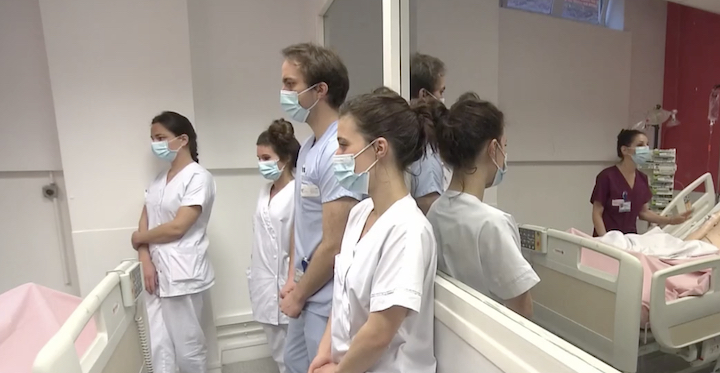The pressure does not weaken at the Saint-Joseph hospital in Paris. We must continue to face an ever-increasing influx of Covid patients. A year after the onset of the crisis, the scenario seems to be repeating itself for already exhausted caregivers.
“If it stays in place, and it continues to rise gradually, yes I’m worried. Because at some point, if you’re full, if you can’t get it to empty somewhere, it’s overflowing”Explains Doctor Cédric Bruel, head of the intensive care unit at this hospital.
Lack of training of caregivers
To avoid overflow, the hospital is organizing itself. The intensive care unit has already pushed its walls with 5 additional beds. All services seek to make room by targeting operations and care that can be unscheduled. Already 40% have been.
“We are forced to close operating theaters to provide competent personnel. Nurse anesthetists and some operating room nurses can go directly to intensive care because they have the skills”Explains Doctor Pomme Jouffroy, head of the orthopedic and trauma surgery department.
Three days of intensive training
But the released personnel are not always able to carry out the very technical care delivered in intensive care. To alleviate this problem, intensive training is in place. Three days instead of the month and a half necessary to be at least comfortable and independent. This lack of personnel is what worries the most today.
“To have beds is not complicated, to have staff is impossible (…) We are realizing, a year later, that to train caregivers for resuscitation, that skills of caregivers, nurses, resuscitation physiotherapists, resuscitation doctors, it doesn’t happen in a week, it can’t be done in three days, it can’t be done in two months. It would otherwise be known. We’re realizing it and we’re paying for it”Protested Doctor Cédric Bruel.
 Cherry tomatoes contaminated with salmonella: 92 sick and 1 dead
Cherry tomatoes contaminated with salmonella: 92 sick and 1 dead  A better coaching method can make a person grow
A better coaching method can make a person grow  What is the method to prevent diabetes in children?
What is the method to prevent diabetes in children?  What are the effective factors in causing stomach ulcers?
What are the effective factors in causing stomach ulcers?  Why do embarrassing memories seem to appear at night?
Why do embarrassing memories seem to appear at night?  The amazing link between SARS-CoV-2 infection and newly started diabetes
The amazing link between SARS-CoV-2 infection and newly started diabetes  WHO says monkey pox is not a global emergency right now
WHO says monkey pox is not a global emergency right now  Single cell RNA sequencing uncovers new mechanisms of heart disease
Single cell RNA sequencing uncovers new mechanisms of heart disease  Hepatitis of unknown origin: 3 new deaths and 228 cases worldwide
Hepatitis of unknown origin: 3 new deaths and 228 cases worldwide 